“I Reject Your Hypothesis”: A Justified Comment From Quentin Tarantino?
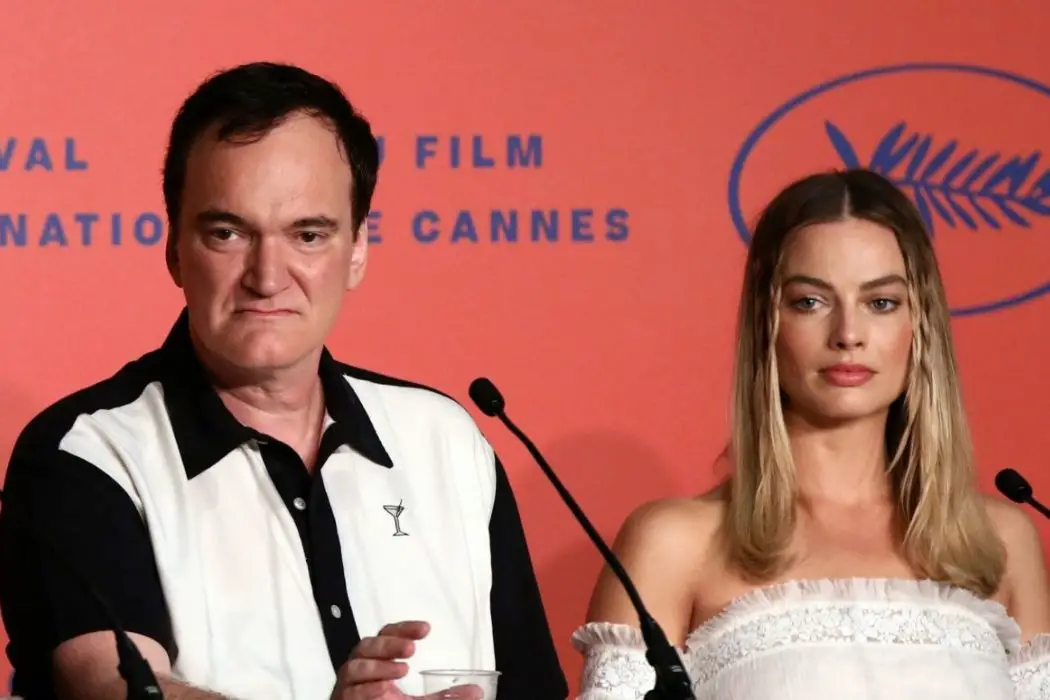
Rachael Sampson is a Yorkshire screenwriter and film critic. She…
Once again, another awkward encounter between a reporter and Quentin Tarantino has fallen into mainstream news. Usually, the questions that rattle Quentin‘s cage surround racism or brutality in his movies: “Why are your movies so bloody and violent?”/”why do you consistently use the N-word?” etc. This time, however, it was about female representation in his upcoming film Once Upon A Time In Hollywood – set to be released at the end of the month.
Tarantino is notorious for having a short fuse in interviews, but many are correlating this specific question and the fact that it was a female reporter whom he abruptly snapped at, to mean he is just another old white male director, carelessly contributing to the gender bias in cinema and dismissive of women altogether; a plausible opinion when he has spent most of his career working alongside the disgraced sexual predator Harvey Weinstein and also because he was flagged during the intense #MeToo revelations last year by Uma Thurman. (He pushed her too far during the Kill Bill: Volume 2 shoot which subsequently gave her lifelong neck and knee injuries.) It is easy to take these facts and summarise that the above is true… but is it really?
A conclusion cannot be drawn upon the representation of women in Once Upon A Time In Hollywood as its release is not for another couple of weeks, but through analysing the reporters question, the directors response and the plethora of work/female characters in the Tarantino universe, it is possible to denote if his reaction was valid or at least, understandable.
Hypothesis Breakdown:
After the screening of Once Upon A Time In Hollywood, a reporter asked Tarantino at Cannes Film Festival the following question: “Quentin, you have put Margot Robbie, a very talented actress – actor – in your film, she was with Leonardo (DiCaprio) in Wolf of Wall Street, I Tonya; this is a person with a great deal of acting talent and yet you haven’t really given her many lines in the movie. I guess that was a deliberate choice on your part and I just wanted to know why that was – that we don’t actually hear her speaking very much, and Margot I wanted you to also comment about being in the film and this part.” Tarantino then responded with: “Well, I just reject your hypotheses.” This was a calm yet stern response, but the awkwardness is palpable.
The translation of this “hypothesis” (especially from Tarantino‘s perspective) insinuates that he has consciously avoided giving Robbie more dialogue. By mentioning her previous notable movies, the reporter is suggesting that due to her high status in Hollywood, she should have more lines/screen time (supposedly a similar amount to Brad Pitt and Leonardo DiCaprio). Actively choosing to give her less can only denote that he is just like all the other stereotypical male directors in the film community by giving unequal weight to female representation – why else wouldn’t he?
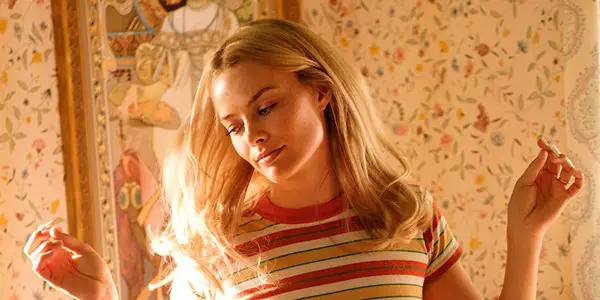
It can be said that one of the many plausible faults this question has, surrounds the fact that it implies screenwriters should compromise their cinematic vision just because of who is cast in the role. Actors adapt themselves to the script; the script is not adapted for the actors (if it has to be, then that is the sign of a bad script and/or actor). Tarantino is telling a story about Hollywood in the 1960’s and that vision cannot be jeopardised due to Robbie‘s 2019 popularity.
Adding more unnecessary scenes and dialogue just so the audience can see more of Robbie‘s face, weakens the entire film. If anything it says how upside-down the film industry is today: it seems as if society is more interested in seeing their favourite actors on screen, more so than absorbing and appreciating the narrative and respecting the artistic medium itself.
Margot Robbie; a stunning, popular actress playing the role of Sharon Tate; another stunning, popular actress creates a meta complex. Who doesn’t want to see her in stylistic 1960’s attire, dancing around as the American sweetheart and the “klutz”? (As stated in the trailer). There’s a huge romanticism around actors over story, hungry for the celebrity and not the character. Hinting that the lack of limelight on Robbie must be because of the notorious discrimination of women by the elite men in Hollywood, in this context, is seemingly absurd, because Quentin Tarantino is a brilliantly feminist filmmaker.
The Girls of Grindhouse
Tarantino‘s 2007 drama Death Proof is the very definition of girl power. Split into 2 parts: The first introduces the audience to the antagonist of the story – Stuntman Mike (Kurt Russell), and his taste for taking women for a spin in his 1969 Dodge Charger (only to realise that he has doctored his car for maximum, deadly impact). The road ends there for his female passengers, but he gets out unscathed.
The second part of the film explores a group of actresses/stunt women as they take a spin in a 1971 Dodge Challenger. Zoe does a daring stunt on the bonnet and they are almost killed as Stuntman Mike tries to run them off the road. They have the last laugh as the ending of the movie shows the girls kicking the life out of Mike, only to conclude with a freeze frame of them jumping for joy over his lifeless body.
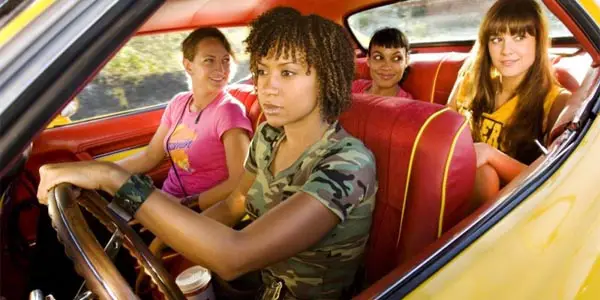
Death Proof is predominantly a female cast and it focuses on women in the stunt industry (a male-dominated field). After the demise of Mike’s first victim (Rose McGowan), karma and revenge catch up with him, and it comes in the form of 3 strong, powerful and bad-ass women. This very scene in the film sums up the themes perfectly and undoubtedly ignites the feminist fire within its audience:
Kim: I don’t know what futuristic utopia you live in, but in the world I live in, a b*tch need a gun.
Abernathy: You can’t get around the fact that people who carry guns, tend to get shot more than people who don’t.
Kim: And you can’t get around the fact that if I go down to the laundry room in my building at midnight enough times, I might get my ass raped!
Lee: Don’t do your laundry at midnight.
Kim: F*ck that! I wanna do my laundry whenever the f*ck I want to do my laundry.
Abernathy: There are other things you can carry other then a gun. Pepper spray.
Kim: Uh, muthaf*cka tryin to rape me, I don’t want to give him a skin rash. I wanna shot that n*gga down!
Abernathy: How about a knife at least.
Kim : Yeah, you know what happens to muthaf*ckas who carry knives… They get shot! Look, if I ever become a famous actress, I won’t carry a gun. I’ll hire me a dude dirt n*gga and he’ll carry the gun, and when shit goes down, I’ll sit back and laugh, but until that day, it’s wild west muthaf*cka!
The Deadly Viper Assassination Squad
Death Proof is definitely not a feminist outlier in Tarantino‘s portfolio of films. Look at all the women in Kill Bill: from the Deadly Viper Assassination Squad to the young Gogo Yubari with her Chinese meteor hammer. These women have quick wits, outstanding combat skills and best of all… Are not sexually objectified!
It is a brilliant, brutal and bloody tale of revenge, fuelled by a mother’s scorn. The Kill Bill franchise does not contain the Hollywood archetype of a female character; sexual, dim and pristine. Instead, it portrays women in the light they so deserve. They get their hands more than dirty and take the consequences of the lifestyles they lead on the chin. Rocksalt in the chest or a Samurai through the head? Absolutely no qualms here.
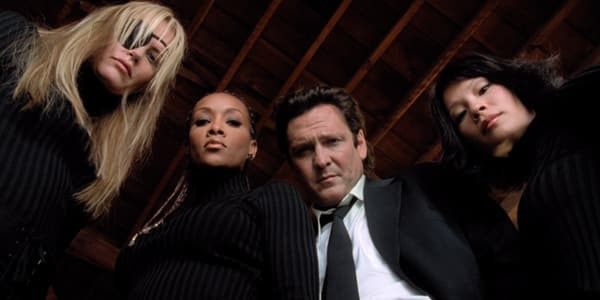
Many male filmmakers tend to cover their backs when their movies feature some sort of “gang”. There might be half a dozen members, but only 1 of them is female – because obviously, that’s more than diverse and representative! In relation to Bill’s Deadly Viper Assassination Squad, however, it’s the other way around. The members include: Black Mamba (Uma Thurman), Cottonmouth (Lucy Liu), Coppherhead (Vivica A. Fox), California Mountain Snake (Daryl Hannah) and then Sidewinder (Michael Madsen). It is incredibly rare to see a team assembled predominantly of women in cinema. Especially in the early 2000s. Tarantino paved a moral path that undoubtedly encouraged other filmmakers and writers to re-think their biased narratives, because Kill Bill was and still is a huge hit. Who’d have thought that by simply changing “he” to “she” in a script, the ticket sales wouldn’t decline?
Oui Shosanna
The character of Shosanna Dreyfus cannot go unsaid when looking at the representation of women in Tarantino‘s films. Once again a tale of revenge, Shosanna (Mélanie Laurent) sees her whole family shot dead as they hide from the Nazi’s during World War 2 in the brilliant Inglourious Basterds. Years later she is presented with the opportunity to kill hundreds of Nazi’s, the Third Reich and the man himself – Adolf Hitler. Many others are also on this pursuit, but her role in Tarantino‘s fabricated re-telling of history is of vital importance/the pivotal crux in the film.
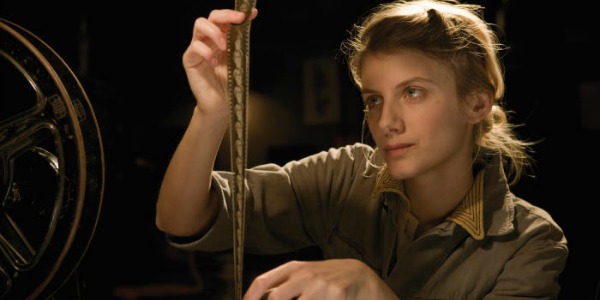
In her driven pursuit, men, or one man in particular: Frederick Zoller (Daniel Brühl) gets in her way as he tries to swoon her. Uninterested, she sticks to her guns and ignores him. Only when she doubts her actions after literally and figuratively shooting him in the heart, does her plan go off the rails – as he shoots her in return. A sort of twisted, reverse Romeo and Juliet.
The audience is filled with frustration as it was the annoying Zoller who ultimately causes her demise. At least Marcel manages to ignite the film in time and blow the cinema up. The last thing the Nazi’s see as they are burning alive is Shosanna’s face projected onto the clouds of smoke. She laughs away as they suffer the same death as her Jewish brothers and sisters.
I Reject Your Hypothesis: Conclusion
On screen, it is evident that Tarantino is an ally when it comes to women in cinema; creating incredibly interesting and layered characters with engaging dialogue and action. Off screen it is slightly hazier; associating with Harvey Weinstein (surely he must have known or seen his behaviour over the years) and pushing Thurman to do a stunt which went horribly wrong. Thurman stated that Tarantino was happy for her to share the footage of her accident, and he holds his hands up and admits that he should not have forced her to do it. He has also defended the disgraced director Roman Polanski on The Howard Stern Show, and years later he came forward with this apology:
“I want to publicly apologize to Samantha Geimer for my cavalier remarks on The Howard Stern Show speculating about her and the crime that was committed against her. Fifteen years later, I realize how wrong I was. Ms. Geimer WAS raped by Roman Polanski. When Howard brought up Polanski, I incorrectly played devil’s advocate in the debate for the sake of being provocative. I didn’t take Ms. Geimer’s feelings into consideration and for that I am truly sorry.
So, Ms. Geimer, I was ignorant, and insensitive, and above all, incorrect.
I am sorry Samantha.
Quentin Tarantino“
As Once Upon A Time In Hollywood tells the tale of Sharon Tate‘s murder (Polanski‘s wife), it infers this situation has potentially played on his mind over the years, and this could possibly be his artistic response. In regards to the question at Cannes and if his reply of “I just reject your hypothesis” was understandable; yes. He is an overtly feminist filmmaker and there are dozens of other examples such as Jackie Brown, Natural Born Killers and Planet Terror, etc. that support this statement.
The work speaks for itself, and to accuse him of consciously restricting Robbie of more dialogue and screen time would undoubtedly feel like a kick in the teeth. Only once the film has been released will audiences gain a true, informed opinion on if the film really needs more Robbie/Tate, but for now, it is safe to say that most audience members feel content in the hands of this feminist filmmaker.
What do you think about Quentin Tarantino’s response? Will you be buying a ticket to Once Upon A Time In Hollywood? Share your thoughts and comments!
Does content like this matter to you?
Become a Member and support film journalism. Unlock access to all of Film Inquiry`s great articles. Join a community of like-minded readers who are passionate about cinema - get access to our private members Network, give back to independent filmmakers, and more.
Rachael Sampson is a Yorkshire screenwriter and film critic. She often finds herself daydreaming about Andrea Arnold's filmography or crying over The Graduate.












